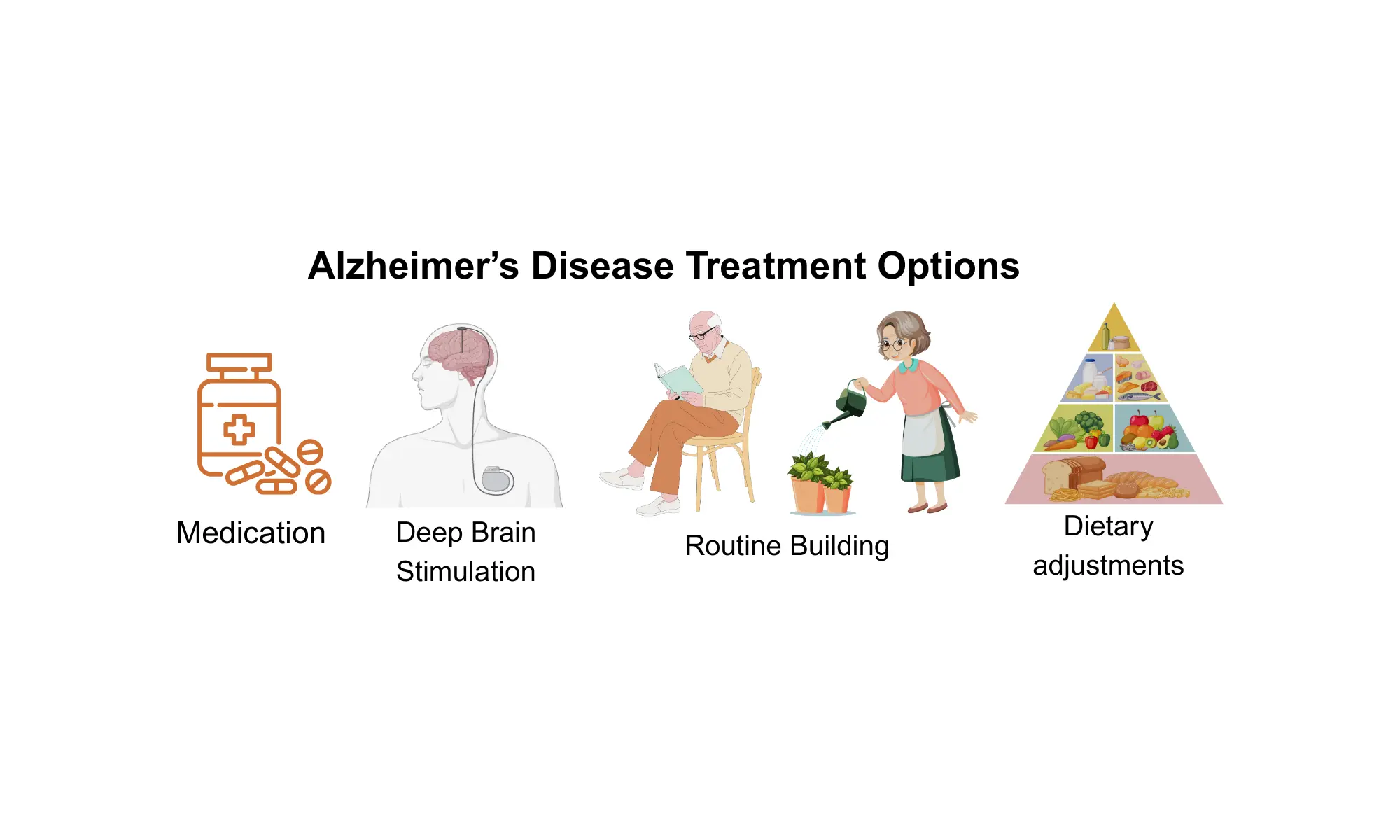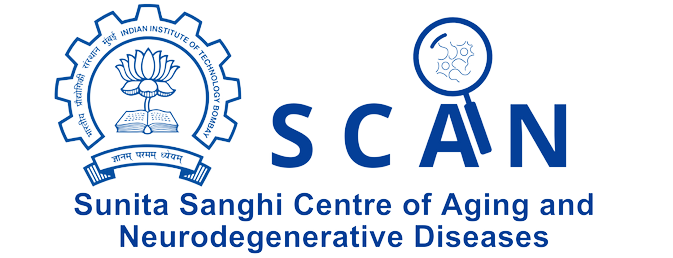Understanding Alzheimer’s Disease:
A Beginner’s Guide

Treatment Options for Alzheimer’s Disease
Although Alzheimer’s disease has no cure, several treatment options can help manage symptoms and enhance the quality of life.
1. Medical Intervention
- Cholinesterase Inhibitors
- Mechanism: These drugs enhance communication between neurons by preventing the breakdown of acetylcholine, a key neurotransmitter involved in memory and learning, and its decline is a key feature in the pathophysiology of Alzheimer’s disease.
- Indication: Effective for mild to moderate Alzheimer’s disease.
- Memantine
- Mechanism: It blocks glutamate’s over activation of NMDA receptors, which can otherwise lead to neuronal damage.
- Indication: Typically prescribed for moderate to severe stages of the disease.


- Combination Therapy
- Mechanism: Combines Cholinesterase Inhibitor and Memantine for dual action on acetylcholine and glutamate pathways, offering enhanced benefits for moderate-to-severe cases.
- Behavioral Symptom Management
- Antidepressants: For managing mood disorders
- Antipsychotics: Used cautiously to address severe agitation or hallucinations.
- Mood Stabilizers: For irritability and impulsiveness.
Disclaimer: The information provided on this website is based on our best knowledge and has been reviewed by a neurologist. It is intended solely to raise awareness and provide general knowledge about Alzheimer’s disease. This content is not a substitute for professional medical advice, diagnosis, or treatment. The medications mentioned are for informational purposes only and are not meant for oral or unsupervised administration. They should be used only under the strict guidance of a qualified medical professional.
If you or your loved ones are experiencing symptoms or have concerns related to Alzheimer’s Disease, or any other neurological disorder, we strongly encourage you to consult a certified neurologist for appropriate evaluation and care.
Mrs Kumar, a 75-year-old woman from Delhi, was diagnosed with Alzheimer’s disease six years ago. Her neurologist prescribed a cholinesterase inhibitor to help with her memory impairment.
Simultaneously, she began a regular physical exercise regimen and modified her diet as per the doctor’s instructions. She eventually also got a caregiver to help her and keep her safe.
Disclaimer: This example is just for understanding purpose.
2. Non-Medicinal Interventions
- Cognitive Rehabilitation and Training
- Programs designed to help patients to maintain cognitive skills through exercises, memory aids, and problem-solving tasks.
- Physical Therapy and Exercise
- Regular physical activity can slow cognitive decline by improving blood flow, reducing inflammation, and promoting neurogenesis.
- Examples: Yoga, tai chi, and aerobic exercises tailored to the patient’s ability.
- Dietary Approaches
- Mediterranean Diet: Foods rich in omega-3 fatty acids, antioxidants, and anti-inflammatory properties, such as nuts, olive oil, and fish.
- MIND Diet: Combines Mediterranean and DASH diets, emphasizing brain-friendly foods like berries and leafy greens.
- Supplements: Studies are investigating curcumin, vitamin D, and omega-3s for their neuroprotective properties.
3. Supportive and Technological Therapies
- Caregiver Support
Training programs help caregivers manage daily challenges, reduce stress, and prevent burnout. - Assistive Technologies
Memory aids, medication reminders, GPS trackers, and smart home devices provide independence and safety for patients. - Behavioral Strategies
Establishing predictable routines can reduce agitation and confusion.
4. Global Research Trends
- Immunotherapy Vaccines
Research into vaccines targeting amyloid-β and tau proteins is ongoing, aiming to prevent disease onset and progression. - CRISPR and Gene Editing
Advances in gene therapy could enable the targeting of high-risk genes like APOE4 to delay Alzheimer’s disease progression. - Artificial Intelligence (AI)
Machine learning algorithms are being used to identify early biomarkers of Alzheimer’s disease in imaging and genetic data, improving diagnosis and treatment timelines. - Ephexin 5
Scientists have identified a protein, Ephexin 5, which is overproduced in the brains of people with Alzheimer’s disease. This protein limits connections between brain cells, known as synapses, contributing to the memory decline characteristic of the disease. The production of plaques is triggered by excessive production of Ephexin 5. However, experiments in mice revealed that blocking Ephexin 5—even in brains already affected by plaques—prevented or halted memory loss. Targeting this protein could lead to groundbreaking therapies. A drug that suppresses Ephexin 5 may preserve synaptic connections and protect memory, potentially transforming treatment options.
Role of Gut Microbiota in Alzheimer’s Disease
- The gut contains a community of tiny organisms (microbiota) that help with digestion and overall health. These gut microbes communicate with the brain through the gut-brain axis, influencing mood, memory, and brain function. The gastrointestinal (GI) tract regulates hormone release, digestion, and blood flow.
- When gut bacteria become imbalanced, the intestine becomes more permeable, triggering inflammation and weakening the blood-brain barrier. This can lead to brain cell damage and may increase the risk of various neurodegenerative disorders. Harmful bacteria release toxic substances that worsen inflammation, leading to neuron loss.
- Studies suggest that maintaining a healthy gut microbiota may help prevent Alzheimer’s symptoms. Probiotics (good bacteria) could be a potential treatment by restoring gut balance and reducing inflammation, making this an active area of research.
Including gut-friendly foods in your daily diet can help maintain a healthy gut microbiota and potentially reduce the risk of Alzheimer’s disease by lowering inflammation and supporting brain health. Here are some beneficial food items:
1. Probiotic Foods (Food for Good Bacteria)
These contain foods that feeds healthy gut bacteria: Eg: Yogurt (with live cultures), Garlic Onions, Leeks (a vegetable belonging to the onion family), Asparagus, Bananas (especially slightly unripe), Oats, and Apples.
2. High-Fiber Foods
Fiber helps gut bacteria thrive and reduces inflammation: Eg: Whole grains (brown rice, quinoa, whole wheat), Legumes (lentils, chickpeas, beans), Nuts & Seeds (almonds, walnuts, flaxseeds, chia seeds), Leafy Greens (spinach, kale, broccoli).
3. Omega-3 Rich Foods (Reduce Inflammation)
Healthy fats help maintain brain and gut health: Fatty fish (salmon, mackerel, sardines), Walnuts, Flaxseeds & Chia seeds, Olive oil.
4. Polyphenol-Rich Foods (Support Gut & Brain Health)
These plant compounds act as antioxidants and support gut health: Berries (blueberries, strawberries, blackberries), Dark chocolate (with high cocoa content), Green tea, and Turmeric (contains curcumin, anti-inflammatory).
5. Fermented Beverages
Eg: Kombucha (fermented tea) and Buttermilk (traditional, not processed)
By incorporating these foods into your daily diet, you can support gut health, reduce inflammation, and lower the risk of Alzheimer’s disease by promoting a strong gut-brain connection.
Foods to Avoid (Harmful for Gut Microbiota & Brain Health)
- Processed foods (refined sugar, artificial additives)
- Excess red meat
- Fried and high-fat foods
- Excessive alcohol
- Sugary drinks
Disclaimer: Based on observational studies, gut microbiota may play a role in Alzheimer’s disease; however, no randomized controlled trials (RCTs) have been conducted to date, and the causal relationship remains under investigation. Therefore, the dietary recommendations provided here should be considered as soft guidelines rather than definitive medical advice.

